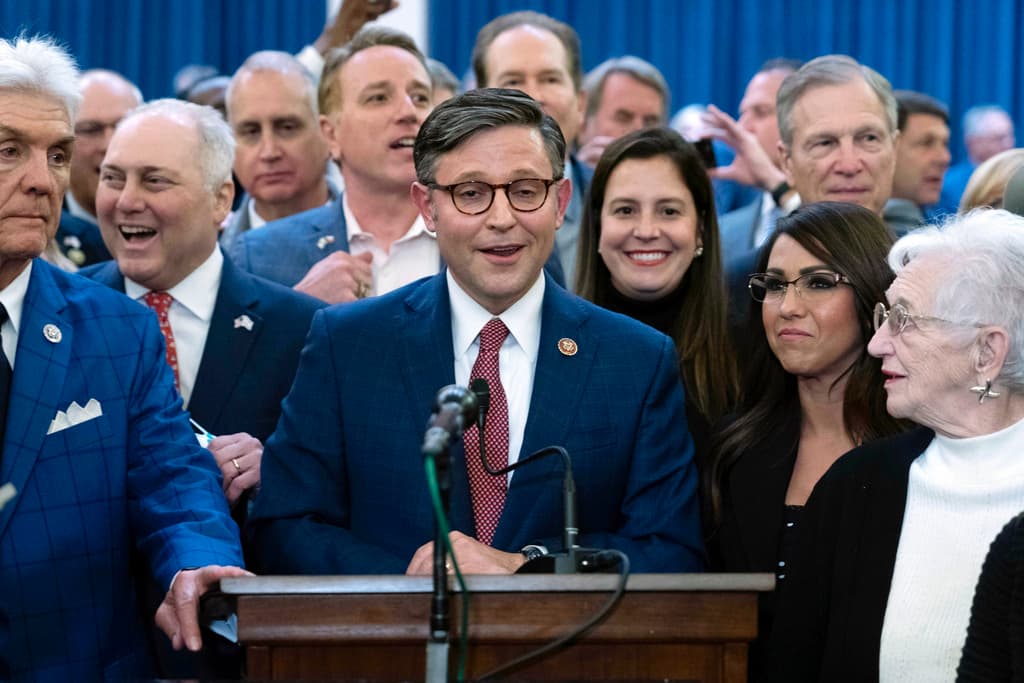The House Steps Up on Wartime Aid
This is a moment to study George Washington’s Farewell Address — and what it suggests in the age of a-bombs, drones, and hypersonic missiles.

The vote of 366 to 58 by which the aid bill for Ukraine, Israel, and Taiwan passed the House will, we’d like to think, put paid to doubts about the fidelity of the broad American public to our common cause in the current crises. That point is all the more newsworthy given the debate that has been underway on the libertarian right. It has been probing whether and how far America should invest in these wars. That debate has a pedigree in our history.
It goes back, after all, at least as far as George Washington’s Farewell Address. That’s the address in which the first president warned against European entanglements. He marked that, say, Europe “has a set of primary interests which to us have none, or a very remote, relation.” He reckoned it would be unwise “to implicate ourselves by artificial ties in the ordinary vicissitudes” of European politics or the ordinary “collisions of her friendships or enmities.”
“Our detached and distant situation,” Washington wagered, “invites and enables us to pursue a different course.” He dilated on that point, suggesting we remain “one people under an efficient government.” Then he proffered the famous poser: “Why, by interweaving our destiny with that of any part of Europe, entangle our peace and prosperity in the toils of European ambition, rivalship, interest, humor or caprice?”
Then again, that was before the development of the A-bomb, hypersonic missiles, and drone swarms. Even Washington himself was prepared to honor existing treaties. Plus, if, say, France had followed the isolationist view that George Washington was recommending for his new country we might have lost the revolution. Washington did mark that we may safely trust to temporary alliances for extraordinary emergencies.
We re-read Washington while Speaker Johnson mustered the wherewithal to make a deal with the Democrats. That delivered a unifying bill, most of which was backed by majorities of both parties in the House, for which President Biden and the House minority leader, Hakeem Jeffries, deserve credit. As things began to move, even President Trump, the GOP front-runner, basically abandoned his noisy opposition to a deal before the election.
Mr. Johnson emerges from this with his stature greatly enhanced. It was he who made the decision to put his own foreign aid package — written, in part, by his experienced and thoughtful national security committee chairmen — on the House floor for a vote. “Let the chips fall where they may,” the 56th Speaker said before the lower chamber voted. The chips fell decisively in favor of an America that is committed to democracy and freedom.
The Speaker made the decision to stick to the tradition of a democratic House. Avoiding large spending proposals that tie together unrelated issues, the Louisianan let his members vote on each individual component — first, a bill that would force TikTok to be sold to an American company and a bill that would seize Russian assets; second, aid for Free China; third, a package for Ukraine; and finally, a restocking of defensive weapons for Israel.
Each of those four components passed on its own merits with overwhelming bipartisan majorities, a point that deserves to be well-marked at Kyiv, Taipei, and Jerusalem — not to mention Tehran, Beijing, and Moscow. The betting in Washington is that the measure will pass the Senate and be signed by the President. It would be an important step — and a rare reassurance that our Congress is capable of working like it’s supposed to.

